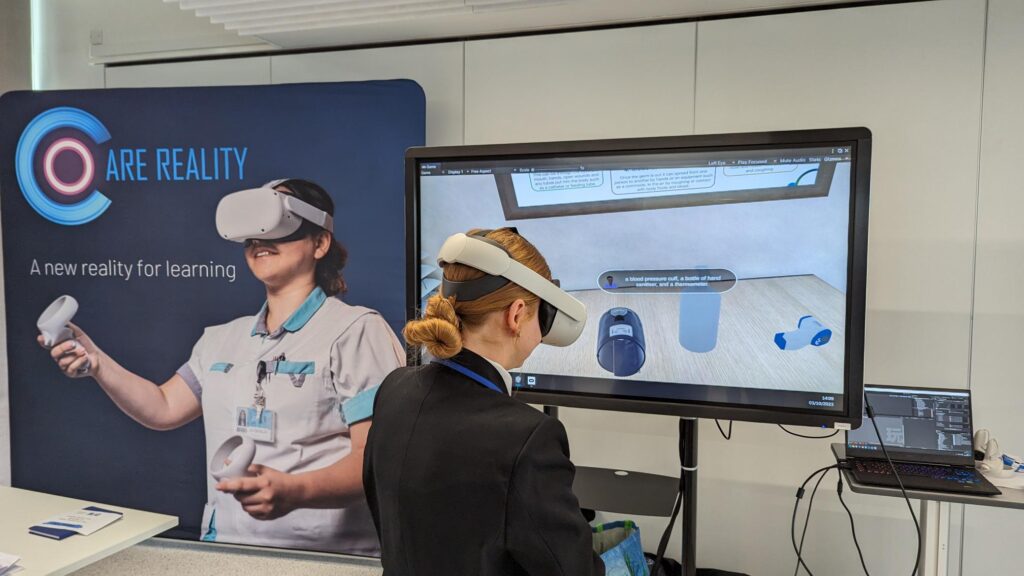12 weeks free VR training for health and social care
Scottish technology start-up Care Reality offers learning grant with free access to its virtual reality learning platform FLO and complimentary VR Headset.
Health and social care organisations in the public, private and third sectors can take advantage of a ground-breaking initiative to improve skills, training and engagement. The 12-week grant from educational software company Care Reality includes unlimited access to the FLO system specifically designed for the health and social care sector, a complimentary VR headset and tailored support and assistance.

Photo courtesy of Care Reality
The grant is also open to further education institutions, training providers, and career and job placement agencies. It’s open to organisations across the UK and the Channel Islands.
This, of course, helps to address an urgent need in the sector, with 2.23m additional posts needing to be filled by 2035, and a 30% turnover rate in social care staff.
Care Reality’s FLO learning platform means learners can immerse themselves in realistic simulations of various roles, bridging the gap between traditional learning methods and the complex challenges that staff can face in reality. The system has been developed in collaboration with a range of professionals, with VR content covering more than 15 learning modules.
The result is something new for VR: an immersive virtual work placement, with a story-led experience that places the user in different roles such as an emergency call handler, care assistant, and pharmacy assistant.
One key element of grant is its focus on career engagement, supporting those seeking jobs and those furthest from education and employment. An ‘Introduction to Health and Social Care VR experience’ has been developed in recognition of the need to attract the next generation of the workforce.
The aim is to demystify preconceived notions about careers in health and social care, and help people better understand if a career in the sector would suit them. The system can then link career engagement, initial training and ongoing workplace skills development.
Other modules include ‘Clinical Observation and Vital Signs’, in which learners take such readings as a patient’s respiratory rate, heart rate, oxygen saturation, temperature and blood pressure. There are also modules on ‘Infection Prevention and Control (IPC)’, ‘Hand Hygiene’, ‘Personal Protective Equipment (PPE)’, ‘Resident and Patient Placement’, ‘Managing Blood and Bodily Fluid Spillages’, ‘Equipment and Linen Management’, and ‘Environmental Management’.
The system also includes means to review and track learners’ progress.
‘We’ve received outstanding feedback from care workers and people working across the sector during our testing, adoption and use,’ Ross Toomer, CEO of Care Reality tells Social Care Today. ‘After engaging over 400 learners last year in our testing with the support of the UFI VocTech Trust, the feedback has been overwhelmingly encouraging. The conversation has naturally evolved to “what’s next?” in terms of learning modules. We’ve taken that on board and are building a VR learning library that’s being asked for.
‘There’s a strong shared understanding among our users and across social care about the benefits seen in healthcare and acute settings from using VR to train doctors, nurses et cetera, and there is growing excitement about its use and availability in social care. The sentiment resonates: it’s time for social care to get onboard VR – and we’re at the forefront of this shift.’
Applications for the grant are now open – and close at 5 pm on March 29, 2024, with the 12-week learning experience taking place over the summer. For more information and to apply, see Health & Social Care Virtual Reality Learning Grant 2024.
In related news:
New study links hospital privatisation to worse patient care
Ethnic minority NHS staff likelier to face workplace discrimination















